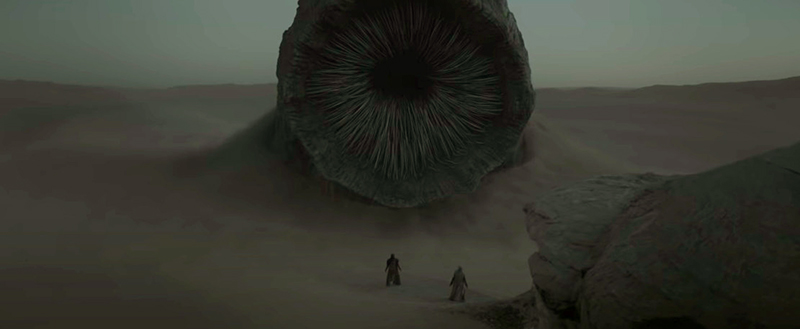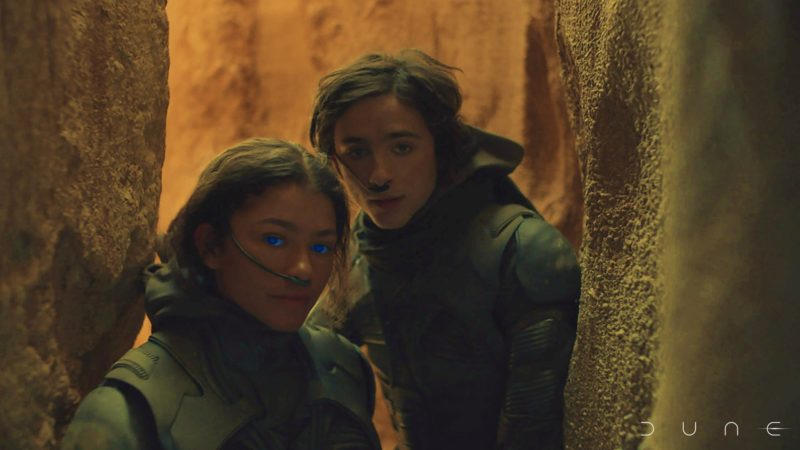Dune Doesn’t Just Surpass Previous Takes, It Swallows Them Whole

Creating a movie review typically follows a general formula: open with vague hints about the movie’s quality, add color through some dispassionate commentary about the director and the cinematography, and eventually voice one’s opinion as to whether the film was great or garbage. This is largely to keep readers engaged in the entire review by not revealing the crucial “here’s what I thought” too soon. I typically follow that structure when writing reviews: introduce the movie, elaborate on its structure and story, and slowly build towards revealing whether I thought the movie was worth seeing.
For this review, however, I’m dropping The Reveal right up front.
Dune is a sensational, heart-rending, glorious movie. It far surpassed my highest expectations. Put on a mask and go see it on an enormous screen with an enormous sound system. Prepare to be astounded and deeply moved by the immersive storytelling, the relentless build-up of tension, the depth of emotion, and the breathtaking glory and beauty of the cinematography.
I don’t think I’m being hyperbolic when I say Dune is a triumph of visionary filmmaking in an era of prequels and reboots. It is filled with genuine drama and palpable emotion. It revels in slow-fast-slow storytelling and edge-of-your-seat tension, where already knowing the outcome of a sequence in no way blunts the impact.
Frank Herbert’s 1965 seminal masterpiece is a sprawling epic, weaving together narratives of ecology, xenophobia, the costs of capitalism, nobility and banality, warring houses, galactic jihad, multigenerational eugenics, and the limits of human existence. It’s elliptical and challenging, full of larger-than-life characters and more than 8,000 years of backstory hinted at through oblique references. To say nothing of the monstrously titanic sandworms, creatures utterly central to all aspects of life, religion, and economics on the desert planet Arrakis… and capable of swallowing a tank.

All of which makes Herbert’s book notoriously formidable to adapt. David Lynch brought Dune to the big screen in 1984. While it skipped over many critical elements and the effects have not held up well, it’s a cult classic of ’80s sci-fi filmmaking (one that famously featured Sting in a metal loincloth). In 2000, SyFy channel released a Dune mini-series. The format allowed for more complex storytelling, but its basic-cable budget resulted in poor effects and second-rate writing. Alejandro Jodorowsky famously tried to adapt Dune in the mid-1970s. If he had delivered the movie he wanted to make — featuring Orson Wells and Mick Jagger, with production design by H.R. Geiger — it might well be the gold standard for big-screen adaptations. Alas, it never happened.
With that landscape of adaptations and failures, it would take confidence bordering on hubris for a filmmaker to bring Dune to the theater again.
Denis Villeneuve has that confidence. His decisive vision of Arrakis and its inhabitants is instantly the definitive adaptation. He crafted a film that truly captures the drama and complexity of the book, telling a gripping story that includes the critical elements that make Dune so indelible without being overly constrained by them.
Given the sprawling storylines and Machiavellian scheming, one of the biggest challenges is introducing the characters and conflicts to viewers. Villeneuve accomplishes that through essential but reasonably restrained exposition, delivered in discrete chunks that feel inherent to the story rather than clunky. He effectively mixes that exposition with heart-pounding action and a strong focus on characters and relationships.
The result is a brilliantly paced movie, a slow burn that smolders, immolates and recedes, only to catch fire again. The pacing is almost languid at times, a trademark of Villeneuve’s movies. It gives ample time for characters to develop while slowly, inexorably boxing them in. And when those sparks inevitably catch fire, the results are barely-controlled chaos and genuinely dramatic scenes.
He also made the smart decision to split Dune into two movies. It would be practically impossible to do justice to the source material in a single film; by breaking it up, Villeneuve is able to tell the broader story without sacrificing character development or jettisoning essential elements.
Writing about the plot of Dune is a challenge: it’s unnecessary for fans who know the book, and would by necessity be filled with spoilers for anyone not familiar with the story. It revolves around the ruthless effort to control the most valuable commodity in the galaxy — the spice melange, found only on Arrakis, that enables interstellar travel and unlocks human potential — as well as desert power, double-dealing, mysticism, political scheming that makes Game of Thrones seem tame, and of course, sandworms. Suffice to say, Villeneuve brings the complex storylines and intricate plotting to life, creating a faithful adaptation of Herbert’s book filled with the emotional beats and intense conflicts that make Dune such a classic. And, much like Frank Herbert did in the book, shows admirable restraint by not explaining everything, trusting the audience to piece things together.
Grounding that complexity and conflict is truly exceptional acting. The cast breathes life into the characters and their journeys. At the heart of Dune is the House Atreides, a widely-respected noble family forced into a treacherous situation by imperial greed. And the beating heart of that House is Paul Atreides, played with exquisite depth by Timothée Chalamet. He captures Paul’s painful evolution from a beloved, charming young prince to a young man tormented by visions of apocalypse, renewal and destiny. He vacillates between youthful enthusiasm, despair, and anger, a convincing harbinger of the fate that he, Arrakis, and the galaxy could suffer.

Rebecca Ferguson is superb as Lady Jessica, the reluctant gatekeeper to an ancient breeding program that results in her son, Paul. She embodies banked fires and existential dread, shifting from timid housecat to mother lioness in a heartbeat. Oscar Isaac is perfectly cast as the charismatic, sensitive Duke Leto Atreides. His scene with Paul, on the cliff dotted with Atreides family tombs, is genuinely moving, a quiet interaction that embodies a father’s love for his son. Faithful Atreides majordomo Gurney Halleck is played with intense devotion and tightly coiled threat by Josh Brolin. He brings a reserved ferocity to the military genius cum poetry-reciting troubadour, a sharp contrast to the charming bonhomie Patrick Stewart famously brought to the character in Lynch’s Dune. Rounding out the Atreides family is ever-faithful man-at-arms, Duncan Idaho, played superbly by Jason Momoa. It’s almost as if Herbert knew Momoa and created the big-hearted, indomitable Atreides retainer for him. Known more for his charisma and fight scenes than for Shakespearean acting talent, Momoa is perfectly cast here. He is Duncan, full of life and prowess and a bottomless love for the family he protects.
At the center of the machinations against the Atreides family is the obscenely avaricious, utterly unscrupulous, and violently savage House Harkonnen. Two of the nastiest villains in science fiction are House members: Baron Vladimir Harkonnen and the endlessly sadistic Beast Rabban. Stellan Skarsgård, barely recognizable under a brilliantly-realized fat suit, is cold, calculating, rapacious, and subtly terrifying. The SFX team created a realistic, believable version of the corpulent, vile Baron, skipping the pustulant boils found in Lynch’s Baron in favor of letting Skarsgård’s talent bring the odious character to life. His nephew, Beast Rabban, is less intelligent and calculating but far more physically terrifying, all rage and fury. Dave Bautista does a solid job of conveying the sociopathic, brutal, bloodthirsty Harkonnen enforcer. He doesn’t have much to do in Dune: Part 1 but he will be pivotal — and no doubt barbaric and bestial — in part 2.
Like so many great movies, the score for Dune is a major component, an essential and effective auditory complement to the cinematography. Hans Zimmer draws heavily on Middle Eastern vocals and percussion, creating an evocative soundscape that captures the Arabian desert warrior elements so central to Herbert’s book. While Zimmer peppers the score with a few too many of the ultra-deep low notes he’s known for, and at times the high, droning vocals are overly insistent, his scoring brilliantly, slowly, inexorably builds tension and dread and rising heart rates.
Dune is more than the sum of its parts: Villeneuve’s vision and storytelling, Zimmer’s potent and effective score, the incredible cinematography, the brilliant special effects, and the outstanding acting create a kind of alchemy rarely seen in a big-budget genre movie. As a longtime fan of Herbert’s book, I am deeply grateful for this loving adaptation. It is everything I could ask for and more.
A quick personal plea: Please see Dune in the theater. It’s genuinely worthwhile for the immersive impact from a big screen and audio system. And also… to help make it a success, as Warner Bros. will reportedly only make Part 2 if Part 1 does well financially. So, if you see a burly gent with a bushy beard and a tear in his eye while you’re at the theater, it’s probably me, seeing it for the third or ninth time. Feel free to say hello and share a cup of spice coffee.
Dune (Warner Bros., PG-13, 2 hours 35 minutes) gets an A.



